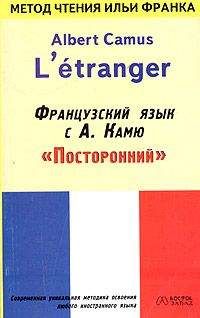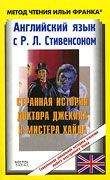Роберт Стивенсон - Английский язык с Р.Л.Стивенсоном. Остров сокровищ
“Well, who’s a better right (ну, а кто важнее: «кто /из них/ имеет лучшее право»)?” growled the gamekeeper (проворчал егерь). “A pretty rum go if squire ain’t to talk for Doctor Livesey, I should think (довольно странное дельце, если сквайр не должен говорить для = должен молчать, чтобы угодить доктору Ливси, я думаю; ain’t = is not).”
double [dʌbl] schooner [`sku:nə] admirable [`ædmərəbl] growled [grauld]
“DEAR LIVESEY, — As I do not know whether you are at the Hall or still in London, I send this in double to both places.
“The ship is bought and fitted. She lies at anchor, ready for sea. You never imagined a sweeter schooner — a child might sail her — two hundred tons; name, Hispaniola.
“I got her through my old friend, Blandly, who has proved himself throughout the most surprising trump. The admirable fellow literally slaved in my interest, and so, I may say, did everyone in Bristol, as soon as they got wind of the port we sailed for — treasure, I mean.”
“Redruth,” said I, interrupting the letter, “Doctor Livesey will not like that. The squire has been talking, after all.”
“Well, who’s a better right?” growled the gamekeeper. “A pretty rum go if squire ain’t to talk for Doctor Livesey, I should think.”
At that I gave up all attempt at commentary (при этом я бросил всякую попытку = решил не комментировать /прочитанное/), and read straight on (читал дальше; straight on — напрямик; straight — прямой): —
“Blandly himself found the Hispaniola (Блендли сам нашел Испаньолу), and by the most admirable management got her for the merest trifle (и благодаря своему восхитительному умению вести дела = ловкости, получил ее за сущий пустяк; management — управление, руководство; хитрость; mere — простой, не более чем, всего лишь; абсолютный, совершенный, полный). There is a class of men in Bristol monstrously prejudiced against Blandly (в Бристоле есть люди, /которые/ ужасно настроены против = терпеть не могут Блендли; prejudice — предубеждение, предвзятое мнение). They go the length of declaring (они имеют наглость заявлять; to go the length of — решиться на /что-то/; length — длина) that this honest creature would do anything for money (что это честное существо = честнейший человек сделал бы что угодно за деньги), that the Hispaniola belonged to him (будто Испаньола принадлежала ему), and that he sold it me absurdly high (и он продал ее мне нелепо дорого = втридорога) — the most transparent calumnies (явная клевета; transparent — прозрачный, ясный; calumny — клевета, ложное обвинение). None of them dare, however, to deny the merits of the ship (никто из них не осмеливается, однако, отрицать достоинства судна).
“So far there was not a hitch (до этого момента не было никаких препятствий; hitch — задержка, заминка). The workpeople, to be sure (рабочие, правда) — riggers and what not (такелажники и прочие) — were most annoyingly slow (были раздражающе медленными); but time cured that (но время вылечило это = управились в срок). It was the crew that troubled me (команда была /тем/, что доставило мне хлопот = пришлось повозиться с набором команды).
commentary [`kɔməntərɪ] trifle [`traɪfl] honest [`ɔnɪst] transparent [træn`spærənt]
At that I gave up all attempt at commentary, and read straight on: —
“Blandly himself found the Hispaniola, and by the most admirable management got her for the merest trifle. There is a class of men in Bristol monstrously prejudiced against Blandly. They go the length of declaring that this honest creature would do anything for money, that the Hispaniola belonged to him, and that he sold it me absurdly high — the most transparent calumnies. None of them dare, however, to deny the merits of the ship.
“So far there was not a hitch. The workpeople, to be sure — riggers and what not — were most annoyingly slow; but time cured that. It was the crew that troubled me.
“I wished a round score of men (я хотел /нанять/ много людей; round — круглый, значительный) — in case of natives, buccaneers, or the odious French (на случай /нападения/ дикарей, пиратов или гнусных французов) — and I had the worry of the deuce itself to find so much as half a dozen (я имел мучения чертовы = совершенно измучился, а нашел лишь полдюжины /матросов/; worry — тревога, мучение; deuce — черт), till the most remarkable stroke of fortune brought me the very man that I required (пока судьба не привела ко мне того самого человека, в котором я нуждался; stroke — удар, взмах; to require — требовать, нуждаться).
“I was standing on the dock (я стоял на пристани), when, by the merest accident (когда, по чистой случайности), I fell in talk with him (я вступил в разговор с ним). I found he was an old sailor, kept a public-house (обнаружил, что он старый моряк, держит таверну), knew all the seafaring men in Bristol (знает всех моряков в Бристоле), had lost his health ashore (потерял здоровье на суше), and wanted a good berth as cook to get to sea again (и хочет /получить/ выгодное место судового повара /кока/, чтобы отправиться вновь в море; berth — койка, место; должность). He had hobbled down there that morning (он бродил /в порту/ в то утро), he said to get a smell of the salt (говорит, чтобы подышать солью = соленым морским воздухом; to hobble — хромать, ковылять; smell — запах).
“I was monstrously touched (я был невероятно тронут /его любовью к морю/) — so would you have been (также и вы были бы) — and, out of pure pity (из чистой жалости), I engaged him on the spot to be ship’s cook (я нанял его сразу же на должность корабельного повара). Long John Silver, he is called (Долговязый Джон Сильвер его зовут: «он назван»), and has lost a leg (и у него нет одной ноги: «потерял ногу»; to lose); but that I regarded as a recommendation (но это я посчитал /лучшей/ рекомендацией), since he lost it in his country’s service (так как он потерял ее на службе у своей страны), under the immortal Hawke (под /командованием/ бессмертного Хока /английский адмирал (1705–1781), знаменитый своей победой над французами/). He has no pension, Livesey (у него нет пенсии, Ливси). Imagine the abominable age we live in (представьте себе = видите, в какую отвратительную эпоху мы живем; age — возраст; век, эпоха)!
score [skɔ:] odious [`əudɪəs] deuce [dju:s] pension [`penʃn] abominable [`əbɔmɪnəbl]
“I wished a round score of men — in case of natives, buccaneers, or the odious French — and I had the worry of the deuce itself to find so much as half a dozen, till the most remarkable stroke of fortune brought me the very man that I required.
“I was standing on the dock, when, by the merest accident, I fell in talk with him. I found he was an old sailor, kept a public — house, knew all the seafaring men in Bristol, had lost his health ashore, and wanted a good berth as cook to get to sea again. He had hobbled down there that morning, he said to get a smell of the salt.
“I was monstrously touched — so would you have been — and, out of pure pity, I engaged him on the spot to be ship’s cook. Long John Silver, he is called, and has lost a leg; but that I regarded as a recommendation, since he lost it in his country’s service, under the immortal Hawke. He has no pension, Livesey. Imagine the abominable age we live in!
“Well, sir, I thought I had only found a cook (я думал, я нашел только кока), but it was a crew I had discovered (но /оказалась/ я обнаружил /целую/ команду; to discover — открыть, обнаружить). Between Silver and myself we got together in a few days a company of the toughest old salt imaginable (вместе с Сильвером нам удалось в несколько дней набрать команду из суровых бывалых моряков, какие только бывают; to go together — идти вместе, быть заодно; tough — жесткий, выносливый) — not pretty to look at, but fellows, by their faces (не привлекательные с виду: «чтобы смотреть на них», но парни, /судя/ по их лицам), of the most indomitable spirit (самого неукротимого нрава). I declare we could fight frigate (я заявляю = считаю, что мы могли бы сражаться /даже/ с фрегатом /имея таких ребят/).




